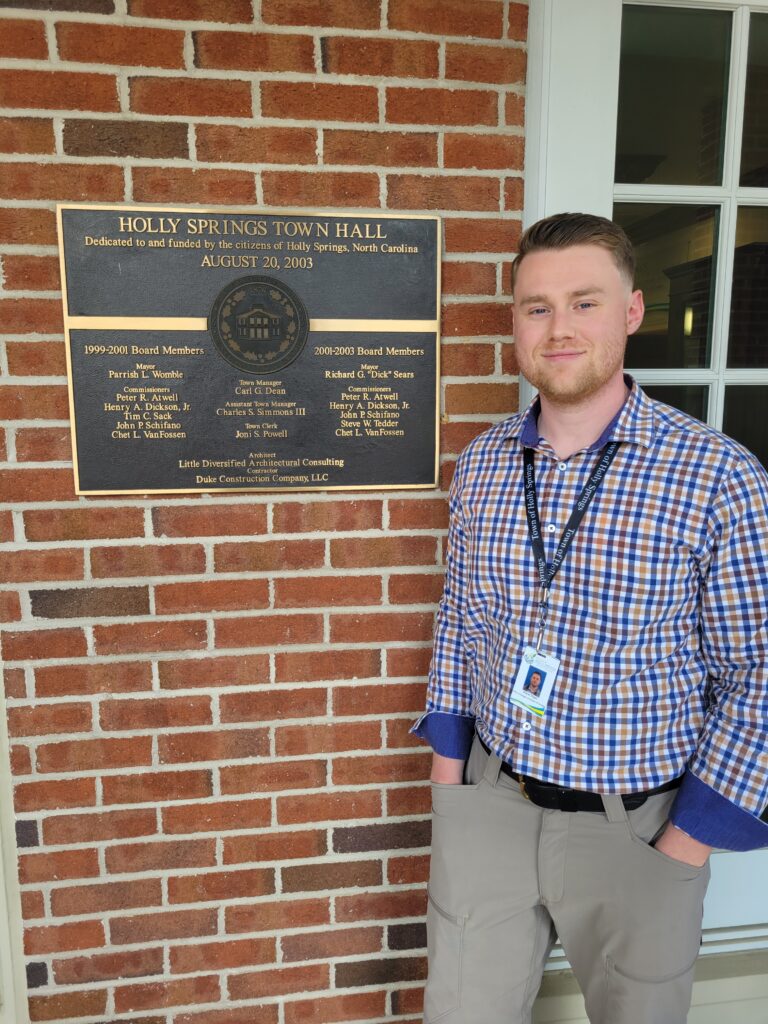
by UNC MPA student Shane Digan
Hello all!
My name is Shane Digan and I am completing my Professional Work Experience (PWE) with the Town of Holly Springs, NC Budget, Innovation, and Strategy Office this summer as I pursue my MPA degree.
I am originally from upstate New York, growing up in Tivoli and graduating from the State University of New York at Oneonta with a degree in Geology and International Studies. I remained in Oneonta for three years after graduating in 2019 working for the Otsego County Planning & Solid Waste Department. I started as an intern while a student and progressed to Planner-Trainee, Planner, and finally Solid Waste Coordinator. While in Oneonta I also served on the Oneonta Planning Commission.
Otsego County hired its first-ever administrator while I was employed there, which helped spark my interest in local government management. I had considered pursuing the planning field further or even state government, but as I learned more about the role of an administrator or manager, I realized that is what I wanted to do. That decision led me to UNC-Chapel Hill. My experience at the School of Government has further cemented my interest in local government management through courses, professors, ICMA, conferences, and peers. I live in Carrboro with my girlfriend Sierra and volunteer with the Boy Scouts of America.

I am currently gaining valuable experience through my work with the Town of Holly Springs. The Town is going through an exciting period, experiencing rapid population and economic growth. While this is great news for the Town, it creates stresses on services that weren’t designed to support such a large base. It is exciting to see how the Town is working to address this growth by expanding services and capital projects. I am personally working with a small but capable team on a variety of projects. I assisted in getting the FY 2023-2024 budget through approval, developed a method to track progress on the Town’s sustainability plan, researched parental leave policies, and am working on developing a sustainable purchasing policy and assisting departments in creating business plans. I have also had the opportunity to visit other departments and learn about what they do—including code enforcement, police, fire, finance, and development services. As the summer progresses, I will continue to work on departmental business plans and sustainability projects, among other assignments. I am excited to attend the North Carolina Local Government Budget Association (NCLGBA) Summer Conference in Beaufort in July.
Working for Holly Springs has been a great experience so far, and I’m sure it will continue to be. The Town has an excellent staff—plus, many are Carolina MPA graduates!
This post was written by current UNC MPA student Mariel Takamura.
*Since the writing of this post, Mariel has taken on more responsibility in ASLRRA’s education department in addition to her role with the communications team. She will be assisting with projects including compiling program reports and managing ASLRRA member resources.
————————————————————————————————————————-
What first started as a simple writing gig to supplement my husband’s income has morphed into a new vocation. Although I am not sure that government work as I have experienced it through the PWE is exactly the right career path for me, I am grateful to have had the opportunity to learn more about this part of ASLRRA’s mission. I am especially glad to have been able to experience this intersection between nonprofit and government work. Where I may have once had the idea of nonprofits as being a more “noble” cause and government work as primarily utilitarian, I now see the importance of both in the world of public service.
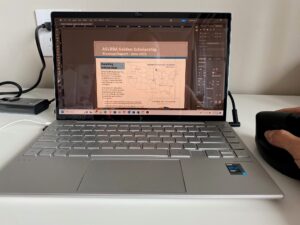
The PWE has also changed my understanding of what it means to be a lobbyist in Washington, D.C. The word lobbyist, to many, might conjure images of sketchy back-room deals, but for the small railroads I’ve encountered in my years at ASLRRA, having a voice on Capitol Hill is an absolute necessity. These railroad companies and many of their suppliers are often small mom-and-pop businesses. I’ve heard countless stories of railroads built by one enterprising individual that now are economic drivers in their communities. I’ve talked with business owners excited about their children’s growing interest in taking over the family company and learned that the S&S in S&S Sales and Leasing, a locomotive supplier, stands for the names of the couple who started the company, and whose son now runs the business. With ASLRRA’s railroad members averaging less than 30 employees – and railroads that operate with only two people – these are not the most powerful, most easily recognized industry group. And they are definitely not the same as the Class I railroads most Americans are seeing in today’s news.
Still, when my PWE ends, I hope to explore other opportunities to help ASLRRA members through different departments within the Association. The education department is responsible for planning and holding webinars and training seminars and developing other resources for members, and I am in talks to assist with projects in that area. I am excited at the prospect of working to help members understand and comply with federal regulations. I came into the MPA program with a desire to learn more about serving communities, and helping create resources that ASLRRA members need to sustain their operations fits a bit better with that original ideal than government advocacy, although both are vital to the industry.
The ability to broaden my knowledge of the short line railroad industry, build connections with ASLRRA’s members and participate in the government process all while applying knowledge gained through the MPA program has been a win-win-win-win situation. The courses I’ve taken through the UNC MPA program have served as a foundation and guide for this PWE experience.
All of my studies have contributed to a broad understanding of nonprofit and government work as it relates to ASLRRA and its mission, though I have found myself to have relied more specifically on concepts relating to leadership and organizational management, law and finance. And the Introduction to Grant Writing course is what largely spurred my interest in working in ASLRRA’s education department, as one project could be pursuit of funding for industry-wide workforce development initiatives.
Altogether, the support I’ve received from everyone at ASLRRA and in the MPA program has been exceptional, and it helps me see that even though I’m no longer in Hawaii, I am still in the right place.
This post was written by current UNC MPA student Mariel Takamura.
While government advocacy work has clear differences from my usual responsibilities producing ASLRRA’s weekly newsletter and social media posts, it dovetails nicely with the idea that much of what we do involves communication. We are telling the short line railroad story and trying to stand out from the many other groups also wanting to be seen and heard.
In particular, the catastrophic derailment and hazardous materials release in East Palestine, Ohio back in February has significantly altered initial plans for my responsibilities within the department. Whereas the year started with work on outreach to congressional offices, primarily those of freshmen lawmakers, to give them a general overview of the short line freight railroad industry and its priorities, the East Palestine derailment has resulted in the need for a new message and new kinds of engagement.
The derailment involved a train operated by Norfolk Southern, a large Class I railroad represented by the Association of American Railroads (AAR), not ASLRRA. Nevertheless, the subsequent rush by federal lawmakers to craft legislation meant to prevent more rail disasters has swept up many of ASLRRA’s Class II and III members. These small railroads, unlike their Class I counterparts, are largely ill-equipped to comply with all the mandates they would face if these bills were passed as they are currently written.
My role, then, has been in support of efforts to help lawmakers understand the potential impact of their work. On the federal budget side, I have also been involved with encouraging representatives and senators to support robust funding for federal grant programs crucial to helping small railroads maintain their infrastructure and make key upgrades. This means I have sent hundreds of personalized emails to congressional staffers talking about our industry and either encouraging them to support robust appropriations or thanking them for doing so.
I also participate in video calls with congressional offices on various matters. At first it was to introduce staff to short lines but now the conversation is focused on talking through potential rail legislation and explaining what works and what doesn’t to achieve the safety goals lawmakers envision. Additionally, I have observed and been involved with the creation of documents, both for internal and external consumption, that convey important short line industry information, redline proposed legislation and more.
ASLRRA is also in the midst of planning an industry fly-in to connect our members with their congressional delegations during a day of in-person meetings, and assisting with that effort is another task on my list.
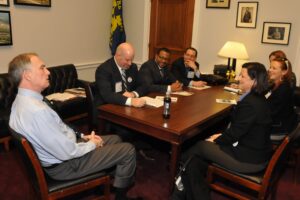
Through the course of this PWE I have worked toward better understanding the complexities of government operations – and Microsoft Excel. But coming from a writing and literary background there was a very steep learning curve. A few months is barely enough time to master much of anything, and especially not the nuances of federal government operations. I know much more now than I ever did about both, yet still am consistently surprised at the effort that goes into government advocacy (and, honestly, Excel).
This post was written by current UNC MPA student Mariel Takamura.
—————————————————————————————————————————
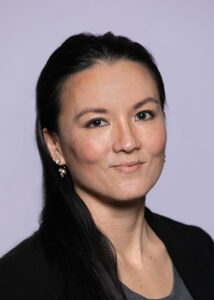
Hawaii is the only state in the nation without any freight railroad service. How someone like me, a third-generation local born and raised in the islands (and a former teacher with a background in English literature) ended up as an intern with the government affairs team at a nonprofit trade association representing short line freight railroads is a not-uncommon question; it’s one I have even asked myself.
The answer involves, at least partially, the U.S. Air Force. Being a military spouse has meant moving to a new state, or country, an average of every two years. Early on, when my husband and I were starting a family, I decided to forgo my teaching career. Later efforts to find a job more accommodating to military life led to a writing position at the American Short Line and Regional Railroad Association (ASLRRA), where I learned about the importance of the work done by ASLRRA on behalf of small-business railroads.
My experience with ASLRRA and the realization that I wanted a full career change converged with a family member’s recommendation that I consider a master’s degree in public administration – all of which led me to UNC’s online MPA program. Then, when the time came to complete my PWE, a position opened up in ASLRRA’s government affairs department and the pieces fell into place.
Working on government affairs issues has allowed me to dive into advocacy and understand how organizations make their voices heard on Capitol Hill. I’ve especially become more familiar with the federal legislative and budgetary process and all the work that goes in to giving ASLRRA members a voice in Washington.
This post was written by current student Julia Murphy.
Since I decided to complete my PWE requirement with my current organization, it shaped up to be a ‘special project’ that I dedicated time to during and outside of the workday. The school regionalization conversation in my boss’ district is an issue that I was familiar with prior to starting my PWE, so I felt that by engaging in more in-depth research about rural schools and different collaborative models I could contribute important context to my boss’ involvement and provide useful information. It also doubled as an opportunity for me to learn more about education policy, which I have also been interested in but do not work closely on in my day-to-day. From the outset, I knew I wanted to include qualitative interviews in my project. I felt it was very important to talk to experts, people in the education space, and individuals who deeply understand the challenges that rural schools face. In conjunction with my additional research – which involved combing through the Massachusetts Commission on the Fiscal Health of Rural Schools report from 2022 – the qualitative interviews brought life and perspective to the concepts I was learning about and working to articulate.
The most challenging part of the process has been twofold. First, because the nature of the final deliverable itself is flexible and does not require adherence to a rigid structure, I had to figure out the best and most effective way to communicate the magnitude of information that I was receiving. I spent a lot of time trying to figure out what the best medium to present the information was and what purpose I wanted the final deliverable to serve. I ultimately decided that a comparative analysis of regional and shared-service school models was a sensible way to incorporate the themes from my research and would be a helpful resource for my boss as he continues to be a key stakeholder in local discussions. In many ways, the lack of structure mirrors the daily operations of my job as a legislative staffer. Early on, I recognized the importance of creating structures to keep myself on track and meeting goals and deadlines. I worked hard to implement the same strategies for my PWE, aiming to set up one interview per week and dedicating time to specific tasks such as researching and outlining.
The second challenge was dissecting the data I collected and figuring out how to use it. When it came to the qualitative interviews, I applied the skills we learned in PUBA 719 with Dr. Chris Cody regarding how to identify broad themes amidst an influx of information. Although I used quantitative methods for my research project for PUBA 719-720, the material on effectively conducting and analyzing qualitative interviews was helpful. That course also helped me design my interview questions in a way that directed the conversation in the intended way and helped me get the information that I knew would be beneficial to my project. The sorting through and eventually putting pen to paper was difficult, but I was grateful to have already refined some of those skills through my coursework. The final deliverable encapsulates the aims of my project, highlights key themes, and can exist as a living document that can be added to and edited as the case in my boss’ district progresses. In the interim, I am proud of the work I was able to accomplish in a relatively short amount of time and thoroughly enjoyed the learning process along the way.
This post was written by current student Julia Murphy.
————————————————————————————————————————
After graduating from Providence College in 2021, I always knew that grad school would be part of my plan but I didn’t know when. I began working in the Massachusetts House of Representatives for Rep. Smitty Pignatelli immediately after graduation and dove head-first into my career in public service. The job was exactly what I was looking for – relationship-based and people-focused. The ability to help people was incredibly fulfilling, and I learned so much so quickly. It was a bonus that Rep. Pignatelli represents the area of western Massachusetts where I grew up, so the issues we work on are close to home. About three months into the job, I recognized an academia-sized hole in my life. I loved work, but I also missed being part of a learning environment that challenged me to think critically and expand my perspective beyond what was on my desk on any given day. I also realized that I was not necessarily willing to give up the incredible on-the-ground experience I was getting through my job, so I began to explore part-time and hybrid school options.
I chose to pursue an MPA because I am passionate about doing and leading. As a political science major with a minor in public and community service studies, I developed the ability to translate complex, theoretical concepts into action and move the needle forward. Since implementation is a foundational principle of public administration, I knew that this was the track for me and that the MPA@UNC program was the perfect fit as I thought about my constantly evolving short and long-term career goals. The opportunity to be part of the world-renown School of Government and learn from experts in the field was so exciting, and UNC quickly became my top choice. In conjunction with my work in the State House, I was confident that this program would propel me and help me develop my aptitude for policy, my capacity to communicate effectively, and my ability to become a public service leader. The leadership component of the MPA program is what sets UNC apart and was a major selling point for me. In an era where courageous and moral public leadership is lacking, UNC is actively nurturing the next generation of public service leaders as they prepare to tackle the most pressing issues of our time. Now that I am just over halfway done with the program, I can confidently say that I have grown in my own understanding of my leadership capabilities and have been given opportunities to apply my learning in meaningful ways.
For my Professional Work Experience (PWE) requirement, I am working on a comparative analysis evaluating shared service and regionalization models for rural school districts, using the Southern Berkshire and Berkshire Hills situation as a reference point, which is where my boss represents. I have always had an interest in education policy, and focusing on these two models is relevant to the decisions that many rural and resource-insufficient districts face across the state and country. An interesting theme that has emerged in my conversations is the process by which these decisions happen – a particularly important point to discuss through the lens of public administration. While choices about the future of schools directly impact students and educators, they are rarely considered or included as important stakeholders. Consequently, there is a great deal of misinformation that can spread when these parties are not informed from the start and therefore, are less inclined to buy in down the road. The emphasis on a collaborative and community-based process was not an aspect that I expected this project to cover but I have come to realize that the final deliverable would be incomplete without it. I am looking forward to finalizing the materials for this project and sharing what I have learned.
UNC MPA student Sally Moore reflects on her time in the program and what’s next for her. Sally was recently recognized for her paper entitled, “The Landscape of Ethics Education for Undergraduates at Public Universities” which she presented at the 32nd Annual International Association for Practical and Professional Ethics conference in Portland, Oregon in Spring 2023. The paper, which she discusses, has also been accepted for publication in the peer-reviewed journal Teaching Ethics. Sally will be graduating in May 2023.
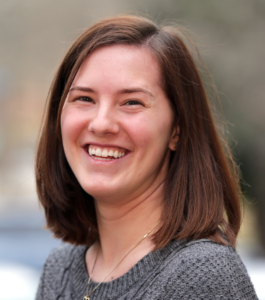
———————————————————————————————————
Tell us a little bit about you, your interests, and why you decided to pursue the MPA.
I work full-time at UNC’s Parr Center for Ethics within the Philosophy Department. As the Director of Undergraduate Programming, I work with 130+ students to sharpen their moral reasoning skills through various programs. I decided to pursue the MPA because I was looking for a program where I could grow as a leader and improve my professional work through classes (such as organizational theory and nonprofit management). Also, it didn’t hurt that my brother, Stephen Moore, graduated with his JD/MPA from UNC several years ago!
You have a paper that you are presenting on at an upcoming conference and that paper has been sent for publication. Can you tell us how this all got started? Did it really start as an assignment for one of your classes?
Professor Berner created a space of curiosity and intellectual empowerment in her class. She encouraged us to pursue topics we were genuinely interested in and that would further our careers. She said we would be national experts on our topics by the end of the year, which was exciting and nerve-wracking. So, I decided to (finally) explore a question I’d had in the back of my mind for years: Do other university-based ethics centers provide programs for undergraduates? It turns out no one had formally asked that question before – so I dove in and got to work!
What are your plans after graduation?
After graduation, my fiancé and I are moving to Columbus, Ohio! I have just accepted my offer to The Ohio State University’s Ph.D. program in Education (specializing in the Philosophy and History of Education), which starts in the Fall. I plan to explore the role of ethics centers in higher education institutions, which will build on my MPA knowledge and professional experiences.
How has the MPA contributed to your growth both personally and professionally?
The MPA gave me the tools to improve my professional work. I read theories, connected with like-minded peers, tested ideas in collaborative spaces, and learned from experts in the field. Not only did my work improve, but it also became more intentional and enjoyable. Personally, the MPA has awakened an interest in politics I never knew I had. I feel more aware of local issues and better understand national headlines. Plus, I now fully appreciate The West Wing!
So many people think this is a degree for those who want to work in government. How would you respond to this?
An MPA is for anyone who wants to better their community, regardless of where they work. The UNC MPA program provides students with the knowledge to engage with nonprofit work, local government efforts, university programs, and more. I felt free to explore my interests and was always encouraged by professors to bring in my own expertise. To me, an MPA is one of the most flexible and useful degrees out there.
I’m Wes Merritt-an MPA candidate at the UNC Chapel Hill School of Government. I came to the University in the midst of a career change from the financial services world here in D.C. with hopes of learning more about how I can contribute as a public servant. The UNC MPA program felt like an obvious fit with their very practical and holistic course curriculum.
When I started my Masters back in early 2021, I had an idea of what I wanted to do – to work for either a non-profit or government agency that focused on substance abuse and recovery support services. I was tailoring all my class projects and papers around learning about that world but oddly enough fell in love with Economic Development after taking an elective with Joy Wilkins titled ‘Managing Economic Development’. I had no idea it was an actual profession but was really happy that it mirrored some of my sales/finance experience with the desire to enact more positive change in the public sector. It feels like a natural fit.
After doing some research on the profession I decided to pursue it for my PWE, and my professor Joy was kind enough to introduce me to her contact at the IEDC (International Economic Development Corporation) here in D.C., which actually writes the textbook for the class.
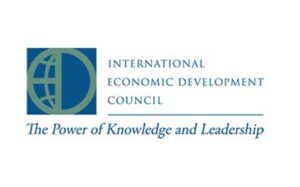
The internship is part-time, and my work is fully remote. I’m really excited about looking at different cities and counties through an Economic Development lens and getting a full picture of what Economic Developers do and how they add value to a local economy. Some of the projects I’ll be working on center around disaster relief and economic resiliency, along with traditional economic development ideas like corporate recruiting and human capital development at local universities.